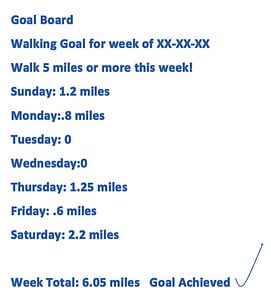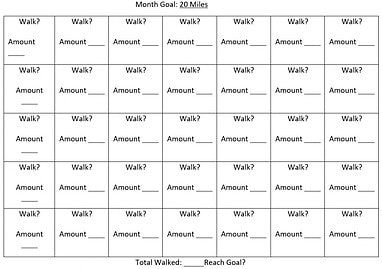Today we’re going to cover weekly goal setting and how to create a weekly goal setting worksheet.
Why set smart goals?
Writing down your goals is a great way to keep track of them. I personally prefer putting them on a white board so I can reset them on a weekly and monthly rate. First you need to establish what is an achievable goal for your walking routine. There will be a big difference if you’re new to walking for exercise versus being a veteran at it.
I consider a smart goal as being one that is challenging but doable. For example if you’re adjusted to a certain time or distance your new weekly goal can be to best that by 10%. If you can walk a mile in 18 minutes, try to challenge yourself by doing in 16 minutes. If you’re used to covering a mile, try to extend that to 1.1 miles. It doesn’t have to be 10% use whatever improvement measurement that works for you.
Creating your weekly goal list.
So, you now know how important writing them down is, so is there a specific format you should use? Different people perform better with their goals formatted certain ways. I use the whiteboard technique I mentioned earlier, but it is far from the only or best way for everyone to create and track their weekly goals.
Since your goal will be broken down by weeks or months usually you can make these goals as detailed as you need or want. I will show a few different examples below.



You also could use an app on your phone to remind you walk at certain times or track it with ones for free on sites/apps like Myfitnesspal. I’ve used Myfitness pal for years, mostly to monitor my calories but the fitness tracking is nice too.
Does it actually help to set goals?
It helps me. If I am motivated but happen to not feel like going for a walk and I look up and see my whiteboard goal waiting to be filled out I feel self pressure to do the walk that day. If I set an alarm and it goes off I have to turn it off and read that I set it to remind me to walk. Does setting these goals and reminders guarantee I walk more? No. That is always completely up to me. I can always ignore what my alarm says and refuse to look at my board. I can make excuses or put it off until tomorrow.
Goals are powerful, but only have as much power as you give them. It feels good to check off a goal as complete or see how close you got. Most people find goal setting is very helpful, though.
Why not set higher goals?
You really want to stick to more achievable goal setting when it comes to physical activity or anything overly challenging. If you set high goal after high goal and continue to come up short, it may simply discourage you to continue trying. If you’re looking for an excuse you’ll find it no matter if you set goals or not, but feeling discouraged through constant failure is definitely a one way ticket to stopping this healthy exercise routine.
So will you start writing down your walking goals?
If you’ve done it in the past and seen it work for other parts of your life, why not start uses goals like this in your fitness? What really do you have to lose but a few minutes of time and perhaps the purchase of a whiteboard. How far can goals setting take you? As far as you are willing to go.
Can’t wait to see you strolling along,
Kimmie
